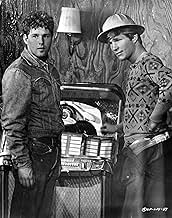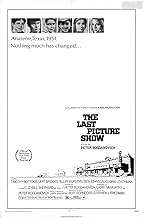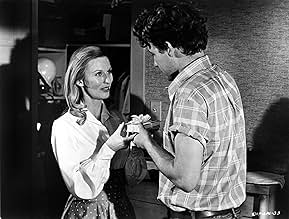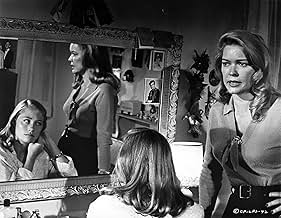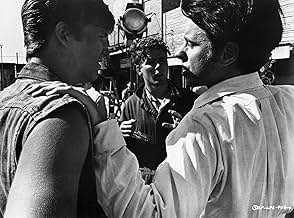Em 1951, um grupo de estudantes do ensino médio chegou à idade adulta em uma cidade desolada, isolada e atrofiada no norte do Texas que está morrendo lentamente, tanto cultural como economic... Ler tudoEm 1951, um grupo de estudantes do ensino médio chegou à idade adulta em uma cidade desolada, isolada e atrofiada no norte do Texas que está morrendo lentamente, tanto cultural como economicamente.Em 1951, um grupo de estudantes do ensino médio chegou à idade adulta em uma cidade desolada, isolada e atrofiada no norte do Texas que está morrendo lentamente, tanto cultural como economicamente.
- Direção
- Roteiristas
- Artistas
- Ganhou 2 Oscars
- 19 vitórias e 22 indicações no total
- Charlene Duggs
- (as Sharon Taggart)
Avaliações em destaque
In the hands of lesser talents, the subject matter of unimportant people doing unimportant things might have yielded a tiresome soap opera. But the film's script is poetic, the direction is skillful, the B&W cinematography is artistic, the casting is perfect, and the performances are superlative.
The story draws heavily from early American individualism. Life here is mostly physical, not mental. Human relationships are direct, immediate, one-on-one. Except for schools, which are given some prominence, cultural institutions exist in the film only vaguely or not at all. For entertainment, people listen to radio, which features the mournful country-western music of Hank Williams. Or, they go to the town's decrepit picture show, where an elderly Miss Mosey kindly returns money to the kids who got there too late to see the cartoons.
If the film has a weakness it is in the presentation of a realism that is incomplete. We see mostly stifling bleakness, though that is ameliorated somewhat by humor. What we don't see are the uplifting influences and the optimism that sustained agrarian generations through hardships and rough times.
Nevertheless, within the film's story parameters, the film does convey an accurate account of what life was like for ordinary folks in West Texas in the early 1950s. I doubt that this film could be made today. Contemporary audiences have been conditioned to expect non-stop action, loudness, glitz, and overblown special effects, all of which are absent, mercifully, from this film.
Low-key, perceptive, bleak, and melancholy, "The Last Picture Show" easily makes my list of Top Ten favorite films of all time.
Bogdanovich's love affair with film is undeniable, though it has, in the past three decades, yielded far more perplexing misfires (The Cat's Meow, At Long Last Love, Nickelodeon) than unqualified successes. That said, The Last Picture Show is an extraordinary accomplishment and worthy of its place in the list of great films of the 1970s.
1971's other important films (Friedkin's The French Connection, Pakula's Klute, Kubrick's Clockwork Orange) are loud, angry, violent and contemporary in-your-face reflections of a society in which rage and nihilism, engendered by Vietnam and the growing discontent over government corruption, is the currency of communication. The uncertainty coursing through the veins of American pop culture also begat in equal, if not equally graphic, measure a palpable sense of sorrow at the destruction of a simpler way of life (no matter how "true" that memory may be).
Like Jewison's Fiddler on the Roof and Altman's McCabe & Mrs. Miller, The Last Picture Show is a powerful and poignant evocation of the death of a community and a way of life. Thematically rich and imbued with Bogdanovich's remarkable knowledge and passion for film, the movie works on a dazzling number of levels; and Bogdanovich's use of nostalgia and traditional, archetypal genre conventions both enriches the movie and compounds the heartbreaking loss at the heart of the story.
His deft handling of a cast comprised of then (largely) unknowns (Bridges, Bottoms, Shepherd) is first-rate and he draws forth superb, often sublime performances from everyone (in particular, Johnson, Burstyn and Leachman). There isn't a false note or a misstep in the movie and there is a naturalness here that is not easily achieved or earned. The great production design (by Bogdanovich's then wife and partner Polly Platt whose contributions to his work and her subsequent involvement in the best works of James L. Brooks should not go underestimated) and the achingly beautiful cinematography by the late Robert Surtees are vital to the success (emotionally, intellectually, thematically) of the film.
The Last Picture Show is a truly rare work of surprising depth and emotional resonance; and the heartache for a time and place forever gone and the desperate and quiet struggles of its very real, very human denizens is matched only by the sorrow found in contemplation of Bogdanovich's Icarus-like fall from such exalted heights.
There is no musical score in this film in the normal sense. The only time you hear music is when a radio is on or a phonograph is playing in the background. This lack of a musical score dubbed over the film enhances the illusion of reality. Another aspect of this sound editing is the choice of music that is being played by the different characters. Bogdonavitch uses song and artist selection to subtly comment on the character of the person or people who are listening to it. In the case of Sonny the music he selects is always Hank Williams and it alludes to the hardscrabble life and down to earth quality of his character. In contrast at JC's home, the manipulative teenager played by Cybil Sheppard, you hear a cover of a Hank William's song that has all of the life sucked out of it, similar to a Pat Boone cover of an Elvis Presley song. It is a direct comment on JC and her family; her family has grown wealthy by owning oil wells and they pretend they are still the same people as before. It is obvious they are not just by this simple musical selection. It is eloquent in its simplicity.
The center of the film and the major theme should you listen to your heart or your libido if the two don't combine in the same person? Perhaps the saddest comment in this film is that too often these two halves to a whole do not come together as a package and people are forced to chose. None of the characters are particularly happy with their mates. Everyone is on the prowl for that perfect person they know they will be happy with. Time and again they think that they've found the perfect person based on their sexual attraction but when they begin to show their authentic selves are then rejected. Those in long term relationships with an emotionally compatible mate but with no sexual interest face an equal dilemma a lack of excitement and joy and are destined to be the ones that reject. It exposes both sides of this human dilemma, a duality that can become split and non-integrated, and does it in a sophisticated and lyrical way. Most people experience this split at some time and in this film, as in life, there are no easy answers. That's why I love this film.
And there is Billy, the boy who continually sweeps the street in a hopeless gesture to turn back the inevitable, representing that demented and futile longing for a past that was never quite as good as you remember it. He represents that longing for an illusion that disappears just as we are about to grasp it and the sadness of that. The broom that is never fast enough for the blowing dust of time.
Você sabia?
- CuriosidadesCybill Shepherd was cast with the option of backing out of her nude scenes if she so desired. She only agreed to do them after asking the opinions of three female costars - Cloris Leachman, Ellen Burstyn, and Eileen Brennan, who all thought she should do them.
- Erros de gravaçãoThe lavalier mic on Duane's tie is visible during the graduation scene.
- Citações
Sam the Lion: You boys can get on out of here, I don't want to have no more to do with you. Scarin' a poor, unfortunate creature like Billy just so's you could have a few laughs - I've been around that trashy behavior all my life, I'm gettin' tired of puttin' up with it. Now you can stay out of this pool hall, out of my cafe, and my picture show too - I don't want no more of your business.
- Versões alternativasSpecial edition includes seven minutes of footage not included in the original release.
- ConexõesFeatured in The Last Picture Show Re-Release Promo (1971)
- Trilhas sonorasCold, Cold Heart
(uncredited)
Written by Hank Williams (as Hank Williams Sr.)
Performed by Tony Bennett
Principais escolhas
Detalhes
- Data de lançamento
- País de origem
- Idioma
- Também conhecido como
- La Última Película
- Locações de filme
- 605 South Ash Street, Archer City, Texas, EUA(high school)
- Empresas de produção
- Consulte mais créditos da empresa na IMDbPro
Bilheteria
- Orçamento
- US$ 1.300.000 (estimativa)
- Faturamento bruto nos EUA e Canadá
- US$ 29.133.000
- Faturamento bruto mundial
- US$ 29.146.746
- Tempo de duração
- 1 h 58 min(118 min)
- Cor
- Mixagem de som
- Proporção
- 1.85 : 1





